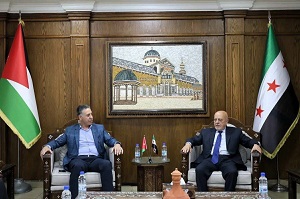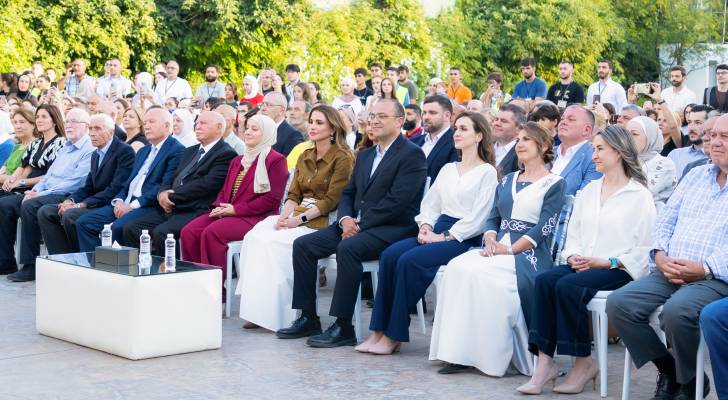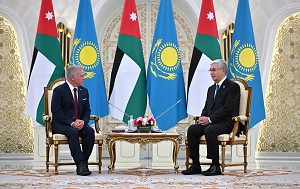Industry minister, Syrian officials discuss means to enhance economic cooperation

AFP
AMMAN — Minister of Industry, Trade and Supply Yarub Qudah has discussed means to enhance economic cooperation between Jordan and Syria, with the Damascus-hosted discussions focusing on following up on agreements reached in recent months.
According to a ministry statement issued on Saturday, talks went over the outcomes of the Joint Economic and Trade Committee meeting held in Amman last month.
Qudah met with Syrian Minister of Economy and Trade Mohammad Shaar and other senior Syrian officials to review measures aimed at accelerating joint efforts to expand economic cooperation.
The discussions also called for increasing trade, encouraging investment, and promoting broader economic integration.
Qudah reiterated Jordan's commitment to providing the Syrian people with all available resources to help rebuild institutions and share expertise, especially in economic fields.
He said that the Kingdom will spare no effort in contributing to Syria’s reconstruction process.
Since the onset of developments in Syria, Jordan has worked “diligently” to support the Syrian people by facilitating the flow of goods into Syrian markets and allowing Syrian products to be exported through Jordanian territory, the statement read.
Both sides stressed the importance of quickly implementing the joint committee’s recommendations to enhance cooperation in transportation, agriculture, customs, standards and metrology, food and drug regulation, industrial cities, free zones, and other technical areas.
The two ministers also highlighted the need to advance economic integration in line with the outcomes of the first Higher Coordinating Council meeting between the two countries, as well as the importance of ensuring the regular convening of the joint committee.
President of the Jordan and Amman chambers of industry Fathi Jaghbir had recently said that Jordan–Syria economic ties are entering a “new era of openness and collaboration,” driven by regional momentum and mutual determination to overcome longstanding obstacles.
“This shift is evident in the recent wave of meetings, forums, and business events, underscoring both governments' and private sectors’ readiness to position Jordan as a key partner in Syria’s recovery,” Jaghbir said at the time.
He also cited a more than 400 per cent increase in Jordanian exports to Syria in the first third of 2025, reaching JD72 million, clear evidence of growing trade between the two countries.
Jaghbir also said that this trade expansion is backed by the reopening of the Jaber crossing, active participation in joint industrial exhibitions, and strong Jordanian representation at Syria-focused trade fairs, where demand for Jordanian goods is notably high.
He highlighted infrastructure, construction materials, pharmaceuticals, engineering, and energy as key export sectors. Demand is also growing for Jordanian products that meet specific technical and medical standards, as well as for consumer goods, food, and building supplies such as cement, pipes, and electrical equipment.
Director of the Jaber Customs Centre Musa Sarheed had recently said that around 1,500 trucks enter and exit Jordan through the Jaber border crossing with Syria each day.
According to official figures, a total of 83,222 trucks had departed for Syria via the Jaber border crossing between the beginning of the year until early July, while 77,632 trucks had entered Jordan from Syria during the same period.
Certificates of origin issued for goods destined to Syria totalled 2,256 by the end of June, with a value of JD38 million, covering industrial and food products such as fertilisers, plastic sheets, and aluminium and wheat flour.




